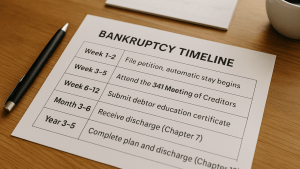
How Long Does It Take to File Bankruptcy? Timeline Guide
How Long Does It Take to File Bankruptcy: Step-by-Step Overview If you’re overwhelmed with debt, you may be wondering how
Error: Contact form not found.
Lorem ipsum dolor sit amet, consectetur adipiscing elit. Ut elit tellus, luctus nec ullamcorper mattis, pulvinar dapibus leo.
If you’re overwhelmed with debt, you may be wondering how long does it take to file bankruptcy. While the exact timeline varies depending on your financial situation and the type of bankruptcy you choose, there are standard steps and average durations to consider.
This article walks you through how long it takes to file, what happens at each stage, and how to speed up the process when possible.
Chapter 7 is often the quicker option, especially for those with simple financial situations. From start to finish, it typically takes:
If your paperwork is complete and there are no objections from creditors, you could receive your discharge within 90–120 days after filing.
Learn more: How Do I File for Chapter 7 Bankruptcy?
Chapter 13 takes much longer due to its structured repayment plan. Expect:
Only after the repayment plan ends will the court issue your discharge. The total time can exceed 60 months.
More info here: How Do I File Chapter 13 Bankruptcy?
Several things can influence how long it takes to file bankruptcy:
Completing the mandatory credit counseling and debtor education courses quickly will also help move things along.
If you’re in a hurry, here are some tips to reduce how long it takes to file bankruptcy:
You can request a Free Evaluation or visit NextLegal for guidance.
Once your petition is filed, your bankruptcy timeline begins. Here’s a general breakdown:
So if you’re asking how long does it take to file bankruptcy, remember that filing is just the beginning—the full process can extend months or even years, depending on your path.
Still asking, how long does it take to file bankruptcy in your situation? Every case is different. Whether you’re dealing with creditor communications, foreclosure concerns, or simply seeking clarity, a qualified bankruptcy attorney can help explain your specific timeline and available legal options.
BankruptcyAttorneys.net connects you with experienced legal professionals who offer guidance tailored to your unique financial circumstances, so you can stop guessing and start taking informed action.
If you’re looking for more information, you may wish to contact us to better understand your options and next steps.
Most cases take 3–6 months from filing to discharge, assuming all paperwork is complete.
Chapter 13 takes 3–5 years due to the repayment plan structure.
Yes. Prepare documents early, complete credit counseling quickly, and file all forms accurately.
No. You’ll attend a 341 meeting about 3–5 weeks after filing, and discharge comes later.
Chapter 7 stays for 10 years; Chapter 13 stays for 7 years after discharge.
Attorney Advertising. This site is a legal marketing service and does not provide legal advice. Submitting information does not create an attorney-client relationship. Results are not guaranteed.

How Long Does It Take to File Bankruptcy: Step-by-Step Overview If you’re overwhelmed with debt, you may be wondering how
| Cookie | Duration | Description |
|---|---|---|
| cookielawinfo-checkbox-analytics | 11 months | This cookie is set by GDPR Cookie Consent plugin. The cookie is used to store the user consent for the cookies in the category "Analytics". |
| cookielawinfo-checkbox-functional | 11 months | The cookie is set by GDPR cookie consent to record the user consent for the cookies in the category "Functional". |
| cookielawinfo-checkbox-necessary | 11 months | This cookie is set by GDPR Cookie Consent plugin. The cookies is used to store the user consent for the cookies in the category "Necessary". |
| cookielawinfo-checkbox-others | 11 months | This cookie is set by GDPR Cookie Consent plugin. The cookie is used to store the user consent for the cookies in the category "Other. |
| cookielawinfo-checkbox-performance | 11 months | This cookie is set by GDPR Cookie Consent plugin. The cookie is used to store the user consent for the cookies in the category "Performance". |
| viewed_cookie_policy | 11 months | The cookie is set by the GDPR Cookie Consent plugin and is used to store whether or not user has consented to the use of cookies. It does not store any personal data. |